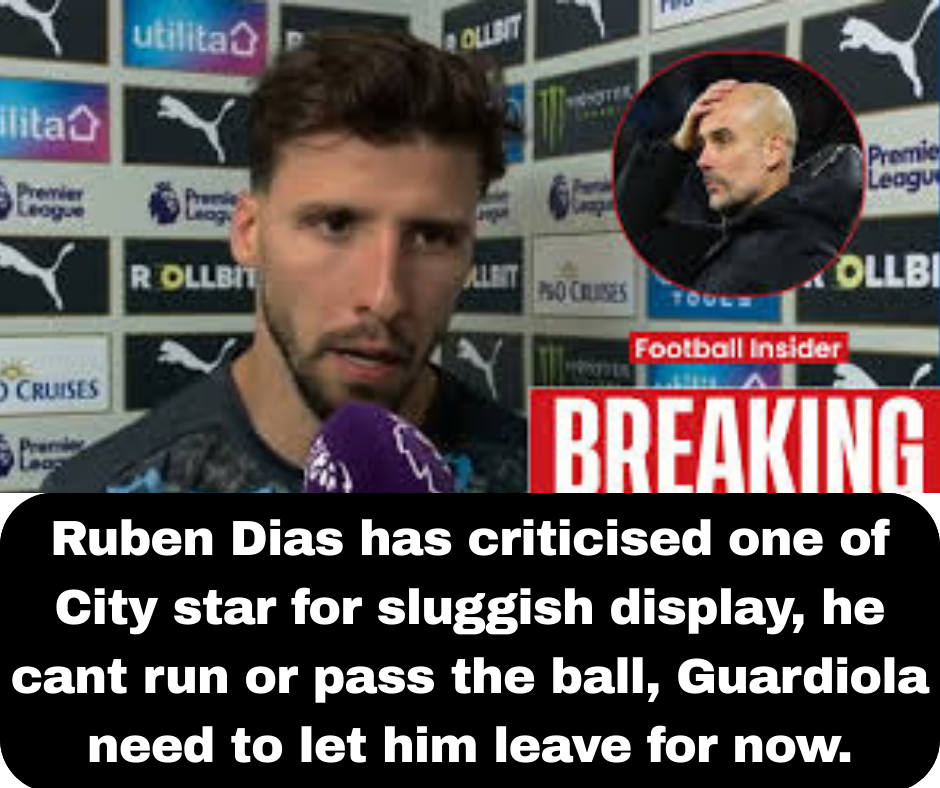Ruben Dias devastated as Southampton don’t roll out red carpet for Man City: ‘Don’t want to win

In the aftermath of Manchester City’s surprising 0-0 draw against Southampton at St. Mary’s Stadium on Saturday, defender Ruben Dias’s post-match comments have ignited a fierce debate about the ethics, aesthetics, and competitive integrity of defensive football in the modern Premier League. As City’s title defense faces unexpected hurdles, Dias’s emotional response provides a window into the psychology of dominant teams when confronted with determined opposition adopting ultra-defensive tactics.
The Unexpected Result
On what many expected to be a routine victory for the defending champions, Southampton—a team battling to avoid setting unwanted Premier League records—managed what few teams have accomplished this season: they kept a clean sheet against Pep Guardiola’s attacking juggernaut. The single point earned took Southampton to 13 points for the season, narrowly surpassing Derby County’s infamous record-low of 12 points set in the 2007/08 campaign.
Manchester City, meanwhile, dropped crucial points in their increasingly challenging title defense. Every match at this stage of the season carries significant weight, with Liverpool now enjoying a more comfortable cushion at the top of the table. What seemed unthinkable in January—City losing their crown—has become a genuine possibility as spring approaches.
Dias’s Outburst: A Window into Elite Mentality
Ruben Dias, typically composed and measured in his public comments, delivered an uncharacteristically passionate critique of Southampton’s approach after the match. His comments reveal the frustration that builds when a team accustomed to dominating possession and dictating play encounters resistance they cannot overcome despite their technical superiority.
“In a moment like this, every point matters and it’s obviously frustrating to play against a team like this,” Dias began, barely concealing his disappointment. “They don’t even try anything, they just sit and don’t even want to win the game, they just want to be there. And it’s not good for the show, it’s not good for themselves, it’s not good for anyone.”
The Portuguese defender’s criticism focused on three main areas: Southampton’s lack of attacking ambition, what he perceived as tactical time-wasting, and refereeing decisions that he believed enabled Southampton’s approach. His comments betray a particular worldview about how football should be played—one that aligns with Guardiola’s philosophy but clashes with the pragmatic reality faced by teams with significantly fewer resources.
“Without being disrespectful and trying to respect the referees as much as we can,” Dias continued, “but we try and [say to the referee], ‘Listen, this is just going to slow down the game. This is not what anyone wants, who is watching, whoever’.”
What’s particularly revealing is Dias’s reference to “the show”—a framing that positions football not merely as competitive sport but as entertainment with implicit obligations to an audience. This perspective has become increasingly common among elite clubs who dominate possession and view themselves as standard-bearers for an attacking, expansive interpretation of the game.
The Tactical Context: Asymmetric Warfare
To understand the context of Dias’s frustration requires examining the tactical disparity between the two sides. Manchester City, under Guardiola’s leadership, have developed an approach predicated on territorial dominance, positional fluidity, and technical superiority. This system thrives on space and movement, with intricate passing patterns designed to disorganize defensive structures.
Southampton, managed by a coach aware of his team’s limitations against such firepower, adopted what tacticians sometimes term “asymmetric warfare”—recognizing a conventional battle cannot be won, so changing the terms of engagement entirely. Their low block, with often all eleven players behind the ball, denied City the space they crave in dangerous areas.
What Dias characterized as not wanting to win might more charitably be described as recognizing the path to potential victory lay not through matching City at their own game—an approach that has led numerous teams to heavy defeats—but through disciplined defensive organization, opportunistic counter-attacks, and maximizing the impact of set-pieces and transition moments.
The statistics tell a familiar story of City dominance: overwhelming possession (likely exceeding 70%), numerous shots (though many blocked or from suboptimal positions), and territorial advantage. Yet the only statistic that ultimately matters—goals—remained level at zero, raising questions about the effectiveness of possession without penetration.
Time-Wasting: Tactical Necessity or Sporting Disrespect?
Dias’s complaints about time-wasting touch on a perennial debate in football. What constitutes legitimate game management versus unsporting conduct? When players stay down after minimal contact, take excessive time over set-pieces, or engage in other clock-running behaviors, they operate in a gray area of football’s etiquette.
“I mean, it kills the rhythm of the game,” Dias observed. “Obviously we still go against it and try and look for our chances, we have to do what we must. But it’s just frustrating.”
The defender’s specific complaint about goalkeeper time-wasting referenced Arsenal goalkeeper Aaron Ramsdale, claiming a double standard in officiating: “The funny thing is we do what [Aaron] Ramsdale did once and straight away it’s a yellow card, he does it 20 times and it’s just play on.”
These observations highlight the subjective nature of how we perceive time-wasting. When one’s own team does it, it’s typically framed as “professional game management.” When the opposition does it, it becomes “cynical time-wasting” or “anti-football.” Referees face the unenviable task of distinguishing between legitimate recovery time, tactical pauses, and deliberate attempts to run down the clock.
The Ethics of David versus Goliath
Underlying this specific incident is a broader philosophical question about football: Do teams have an ethical obligation to play in a certain way? Or is the sole objective to maximize results within the rules as they exist?
Manchester City represents the apex of football’s financial and technical hierarchy. Their resources—financial, coaching, infrastructural, and playing talent—dwarf those of Southampton. In economic terms, this creates a profound imbalance of power that smaller clubs can only address through tactical adaptation rather than like-for-like competition.
Dias himself acknowledged this imbalance, saying: “And obviously we know we’re in a circumstance where we have to attack and they have to sustain.” Yet his frustration stems from believing Southampton crossed some invisible line between legitimate defensive football and something he considers harmful to the sport itself.
Southampton supporters would likely offer a different perspective: their team showed remarkable discipline and determination against overwhelming odds. In their view, it’s precisely this David versus Goliath narrative—and the occasional against-all-odds result—that makes the Premier League compelling viewing globally. The tactical variety, where different philosophies and approaches clash, creates the rich tapestry of storylines that sustain interest beyond the title race itself.
The Historical Context: Pragmatism versus Idealism
Football’s history is filled with this tension between pragmatic and idealistic approaches to the game. From Herbert Chapman’s counter-attacking Arsenal sides of the 1930s to Helenio Herrera’s catenaccio with Inter Milan in the 1960s, through José Mourinho’s reactive Chelsea teams of the mid-2000s, defensive organization has always been a legitimate tactical choice.
Even Guardiola’s Barcelona, often held up as the pinnacle of attacking football, recognized the importance of defensive structure and positional discipline. Their famous “six-second rule” for pressing after losing possession was as much about preventing counter-attacks as it was about regaining the ball to attack again.
What has perhaps changed is the growing resource gap between football’s elite and the rest, which has made asymmetric tactical approaches increasingly necessary for competitive balance. As the financial disparities in the game grow more pronounced, we may see more matches where technically superior teams struggle to break down organized, defensive units—leading to more frustration from players accustomed to imposing their will on opponents.
Weather and Pitch Conditions: Legitimate Factors or Convenient Excuses?
Interestingly, Dias also referenced environmental conditions as contributing factors to City’s difficulties: “It was also not easy to be quick because the pitch was just dry with the sun, it was hot.”
While seemingly minor observations, these comments reveal an often-overlooked aspect of home advantage in football: the ability to prepare playing surfaces that favor certain styles. Teams facing technically superior opposition have long used legal means to level the playing field, including letting grass grow longer or not watering the pitch to slow ball movement.
These small advantages may seem trivial, but at the elite level where margins are razor-thin, they can prove decisive. City’s precise passing game functions optimally on smooth, well-watered surfaces that allow for quick ball movement—precisely the conditions they ensure at the Etihad Stadium but cannot control away from home.
Psychological Insights: The Burden of Expectation
Perhaps most revealing in Dias’s comments is the psychological weight that accompanies being the hunted rather than the hunter. After years of Manchester City setting unprecedented standards in English football, including a historic treble, every match they don’t win is perceived as failure rather than their opponents’ success.
“Everything is still on the table and we’ve got to fight for what we want. Period,” Dias concluded, shifting responsibility back to his own team despite his extensive criticism of Southampton’s approach.
This ability to balance external criticism with internal accountability is characteristic of elite teams under Guardiola. While publicly lamenting obstacles placed in their path, they simultaneously acknowledge their own agency in overcoming these challenges: “We try and we must be better, we must be more dynamic, more quicker.”
The Media and Fan Response: Polarized Perspectives
The response to Dias’s comments has been predictably polarized along tribal lines. City supporters largely echo his frustration, citing it as evidence of how opponents have to resort to “anti-football” to compete. Neutrals and rivals, meanwhile, view his complaints as emblematic of an entitled mentality that has developed at clubs accustomed to overwhelming success.
Social media reactions have been particularly divided, with many suggesting that a team with City’s resources should be capable of breaking down even the most determined defensive setups. Others point out that tactical diversity—including defensive organization and strategic time management—is an essential part of football’s competitive landscape.
Journalists and pundits have similarly split opinions, with some sympathizing with Dias’s frustration while others criticize what they perceive as disrespect toward a Southampton team that executed their game plan effectively within the rules.
The Broader Implications for Football
This incident raises important questions about football’s future direction. As the resource gap between super clubs and others continues to widen, tactical approaches will likely become even more divergent. Elite clubs may push for rule changes that favor attacking play—such as stricter enforcement of time limits on restarts or more added time—while others resist changes that might further disadvantage teams with fewer resources.
Football’s governing bodies face a delicate balancing act: maintaining the sport’s technical evolution while preserving the unpredictability that makes competition compelling. If matches become too predictable based on financial disparities, the long-term appeal of domestic leagues could diminish.
Moreover, there’s a tension between football as athletic competition and football as entertainment product. Dias’s reference to “the show” highlights how elite footballers increasingly see themselves not just as competitors but as entertainers with obligations to an audience. This perspective potentially conflicts with the traditional sporting ethos where the only obligation is to compete effectively within the rules.
Looking Forward: Adaptive Challenges
For Manchester City specifically, this match represents another data point in their seasonal narrative. Title races are won and lost in precisely these types of fixtures—expected victories that become frustrating draws. How Guardiola’s team responds in subsequent matches will reveal much about their championship mentality and tactical flexibility.
The true measure of elite teams is not how they perform when everything goes according to plan, but how they adapt when opponents successfully disrupt their preferred approach. City’s remaining fixtures will test their ability to find solutions against varying defensive organizations, especially as pressure mounts with each point dropped.
For Southampton, this result represents a moral victory in their challenging campaign. While likely unable to escape relegation, performances like this provide building blocks for future competitiveness and demonstrate the value of tactical discipline and collective effort even against seemingly insurmountable odds.
Conclusion: The Beautiful Game’s Complex Beauty
Ruben Dias’s post-match comments, while born from competitive frustration, inadvertently highlight what makes football the world’s most popular sport: its tactical diversity, competitive unpredictability, and capacity to generate compelling narratives beyond raw technical quality.
The drama of football lies not just in spectacular goals and flowing attacking moves, but also in the strategic chess match between opposing philosophies. Southampton’s determined defensive display against Manchester City’s attacking machine represents one small chapter in this ongoing dialectic between attack and defense, resources and resourcefulness, idealism and pragmatism.
As the Premier League season progresses toward its conclusion, these tensions will continue to shape matches, influence results, and ultimately determine champions and relegated teams alike. Dias’s frustrations, while understandable from his perspective, remind us that football’s beauty lies not in conformity to any single vision of how the game should be played, but in the rich diversity of approaches that collectively constitute “the beautiful game.”
For neutrals observing from afar, it’s precisely this clash of styles—and the occasional upset or unexpected result—that maintains interest beyond the title race itself. In that sense, perhaps Southampton’s defensive masterclass against Manchester City serves the interests of “the show” far more effectively than another routine victory for the champions ever could.















